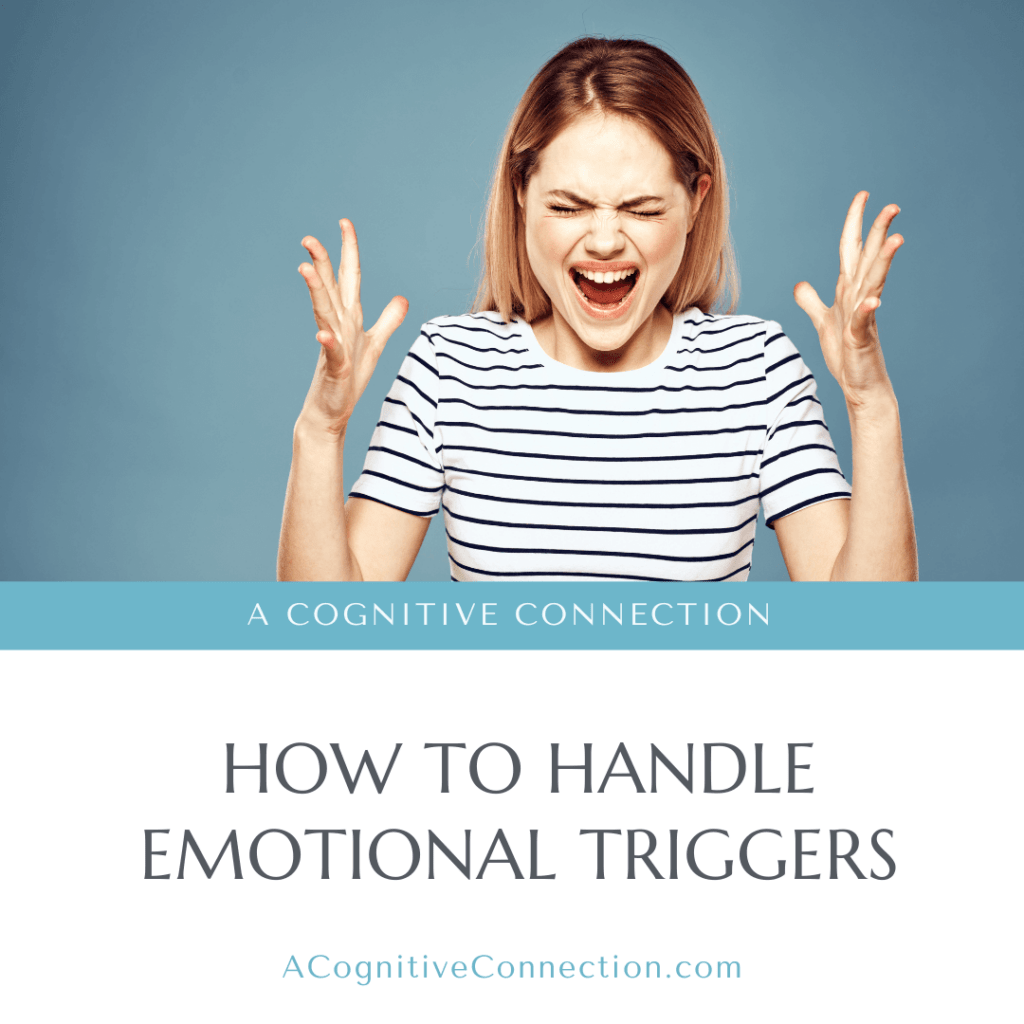They did it again.
They got angry. They slammed the door. They said something rude or snappy. They ditched you. They ignored you or shut you down.
Human behavior can be tricky to understand. We are complex social creatures with deep inner-lives and emotional triggers.
Perhaps you’ve been dealing with someone who has emotional triggers and it’s caused you a lot of stress, or perhaps you yourself have been experiencing them in response to someone else’s actions.
It’s okay. Take a deep breathe because we’re here to help.
Here at a Cognitive Connection, we work with you to understand your emotional triggers, how mindfulness can help you manage them better, and cultivate opportunities for you to grow into a more healthier you. Handling emotional triggers is another example of how A Cognitive Connection can help reclaim your own power.

Understanding the Concept of Emotional Triggers
Emotional triggers are events or situations that provoke an intense emotional reaction within us. These can be memories, experiences, or events that tap into our personal sensitivities, oftentimes rooted in past traumas or deep-seated fears.
Triggers can be anything from a song, a smell, a place, to an action or behavior from someone else that transports us back to a moment of high emotional intensity.
Recognizing your triggers is the first step towards managing them. This awareness can give you a sense of control over your emotions and help you respond rather than react when you encounter these triggers.
Identifying Your Personal Emotional Triggers
Identifying personal emotional triggers requires introspection and honesty with oneself. Start by reflecting on instances when you have had a strong emotional reaction.
- What were the circumstances?
- Who were the people involved?
- What feelings were evoked?
Answers to such questions can offer clues to potential triggers.
Journaling these experiences can be a helpful practice, allowing you to observe patterns over time. Remember, everyone’s triggers are unique and deeply personal, so your process of identification should be patient and non-judgmental.
Do not criticize yourself for your reactions; instead, use this understanding as a tool to better manage your emotional health.

The Role of Mindfulness in Managing Emotional Triggers
Mindfulness plays a pivotal role in managing emotional triggers. It is the practice of being fully present in the moment and accepting it without judgment.
When applied to emotional triggers, mindfulness can help you detach from the immediacy of your reaction, providing the space to observe your emotions without being swept up in them.
By doing so, you gain perspective and are less likely to react impulsively or unhelpfully. Mindfulness helps you respond to emotional triggers in a more balanced, measured way, reducing the power these triggers have over your emotional state.
It is a skill that can be cultivated over time, and with practice, you’ll find it becomes a natural part of your emotional management toolkit.
Practical Strategies for Handling Emotional Triggers
Here are a few practical strategies you can employ to handle your emotional triggers.
First and foremost, maintain regular habits of self-care. This includes eating a balanced diet, getting enough sleep, exercising regularly, and taking time for relaxation and leisure activities. Doing so helps strengthen your overall emotional resilience and capacity to deal with stress.
Secondly, when you feel triggered, try to physically pause and take slow, deep breaths. This can help you regain composure and prevent an immediate, ill-considered reaction. Thirdly, communicate openly about your feelings with trusted individuals in your life. Sharing your experiences can grant you additional perspective and support.
Lastly, consider seeking help from professionals if you find your emotional triggers significantly affecting your quality of life. Therapists and counselors can provide valuable tools and strategies tailored to your specific needs. Remember, it’s okay to ask for help. Handling emotional triggers is a journey of self-discovery and healing, and it’s entirely okay to seek assistance along the way.

Embracing Emotional Triggers as Opportunities for Growth
Emotional triggers, while challenging, can also serve as opportunities for personal growth and self-discovery. When you’re able to identify and understand your triggers, you gain a deeper insight into your emotional landscape.
This understanding opens up avenues for self-improvement and healing. It helps you to develop more effective coping strategies, build emotional resilience, and foster healthier interpersonal relationships.
Remember, the goal is not to completely eliminate emotional triggers – as they are a natural part of being human – but rather to navigate them in healthier, more empowering ways.
Let A Cognitive Connection Help You Overcome Emotional Triggers
At A Cognitive Connection, our mission is to walk with you through your journey of understanding and overcoming emotional triggers. We understand the challenges and the courage it takes to face these triggers head-on, and we’re here to provide the support, tools, and strategies you need for this transformative journey. Remember – handling emotional triggers is not about eradicating emotions, but rather learning to navigate them in healthier, more empowering ways. With patience, practice, and compassion for oneself, it is completely possible to reclaim your emotional power and live a more balanced, fulfilling life. If you’d like to book a free consultation, contact us today!


